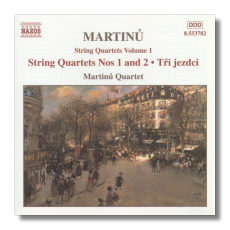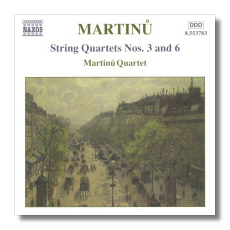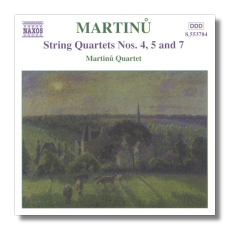
The Internet's Premier Classical Music Source
Related Links
- Martinů Reviews
- Latest Reviews
- More Reviews
-
By Composer
-
Collections
DVD & Blu-ray
Books
Concert Reviews
Articles/Interviews
Software
Audio
Search Amazon
Recommended Links
Site News
 CD Review
CD Review
Bohuslav Martinů

String Quartets
- String Quartet #1
- String Quartet #2
- Tři jezdci
Martinů Quartet
Naxos 8.553782


- String Quartet #3
- String Quartet #6
- Duo for Violin and Cello
- Three Madrigals for Violin and Viola
Martinů Quartet
Naxos 8.553783


- String Quartet #4
- String Quartet #5
- String Quartet #7 "Concerto de Camera"
Martinů Quartet
[Lubomir Havlak, Petr Maceck (violins)
Jan Jusa (viola); Jitka Vlasankova (cello)]
Naxos 8.553784
"There was a child went forth, every day,
And the first object he looked upon, that object he became,
And that object became part of him for the day or a certain part of the day,
Or for many years or stretching cycles of years."
~ Walt Whitman "Leaves of Grass"
The first disc includes Tři jezdci (Three Horsemen) written when Martinů was 12. The excerpt from Whitman's poem came to mind as I listened. This is, however, no juvenile piece. While Dvořák certainly comes to mind, the music here is not merely an imitation. He has become the music he hears.
Listening to the first three quartets I can imagine Martinů playing works by Dvořák, Janáček, Roussel, or Bartók and assimilating the music. When I listened to the first quartet my notes indicated Dvořák. Number two occasioned my writing Janáček. Bartók was the name that appeared as I listened to number three. This is not to suggest that the music is derivative. No, it is distinctly Martinů with his nervous energy coursing throughout; the passionate playfulness that imbues all of his music is already here
I would suggest that the best way to try to grasp the totality of Martinů's quartets is to start by listening to numbers one and seven before the others. Number one opens with the viola playing a haunting note that hovers above the rest of the music like a mist over a fall field of grain in the morning. It is memorable; it is eerie like Martinů even though you feel Dvořák. There are a few moments in the last movement of the First Quartet where I swear Bernard Herrmann got the music for "The Twilight Zone". Then, suddenly, it segues into a Czech folk dance. Absurd perhaps but Martinů lived in an absurd world. By the time I got to number seven I sensed a more classical, tighter feel to things, in fact Haydn came to mind more than once. It was only after writing this that I read the notes and discovered that the writer also made this correlation. The middle works now became a way to study how Martinů got from Dvořák to Haydn and still imbued each with his passionate playfulness and absurdity.
The fourth quartet is firmly in the Romantic vein. It has a melody in it that runs through all four movements that is first clearly brought out around 2 minutes into the first. Martinů takes that melody and writes variations on it, sometimes dissonant and then suddenly lovely, Czech folk music. The adagio is one of the most beautiful things I have ever heard.
Number five is Martinů's "Tragic" Quartet (the label is mine, not his). While moments emerge of the absurd that is part of tragedy, I wonder if its being written in 1938, with Hitler on the move already, has anything to do with the tone*. There are moments that are militaristic tread. The final movement opens sounding like a mother weeping over her dead child. For some reason Górecki's Symphony #3 (Symphony of Sorrowful Songs) came to mind listening to the fourth movement.
Six took be a long time to get into. More than any other quartet I have heard this one reminds me that a quartet is a dialogue. Wisps of music come together into a dissonant turmoil and whilst there are melodic moments, the dissonance is the pervading feeling in the first movement. The cello is the dominant voice in this part of the conversation. The second movement has more tender moments and the Czech element comes out. Here the viola is more prominent. In the final movement it is the first and second violin that lead the discussion. Throughout all three the dialogue feels like four older women who are arguing a lot with moments of tranquility and melody. Throughout the work Czech folk music is never far away and in the final movement the music feels like a dance, perhaps a furiant. There are additional items on disc two. I have chosen to not discuss them for a variety of reasons, mainly because they are really not the main course in this fare. Consider them a lagniappe.
As I was listening to these discs and making notes another writer came to mind, my creative writing professor in undergraduate school. He once said that when we were writing we had to learn to listen to the story (or article) and it would tell us when it was finished. At the time I thought he was nuts. He may have been nuts anyway, but now I know what he meant. This has been a fascinating study for me; a learning experience and I think the damn thing has finally told me it is finished.
* After I labeled the 5th as "Tragic" and speculated on the external influences I sent a copy of my review to Steve Schwartz. He sent me an excerpt from a letter Martinů wrote about the time he was composing his 5th Quartet and the Double Concerto. "… in the mountains, almost completely isolated from the outside world. – in a countryside full of sunlight and the song of birds – while somewhere in Europe the great tragedy that was relentlessly approaching the frontiers of my homeland was being prepared. With anguish we listened every day to the news bulletins on the radio, trying to find encouragement and hope that did not come. The clouds were quickly gathering and becoming steadily more threatening. During this time I was at work on the Double Concerto; but all my thoughts and longings were constantly with my endangered country, where only a few months before I had been fulfilled with such hope and joy by the unforgettable moments at the Sokol Festival."
I also want to thank Steve for pointing out that Bernard Herrmann wrote the theme music for The Twilight Zone.
Copyright © 2003, Robert Stumpf II


















